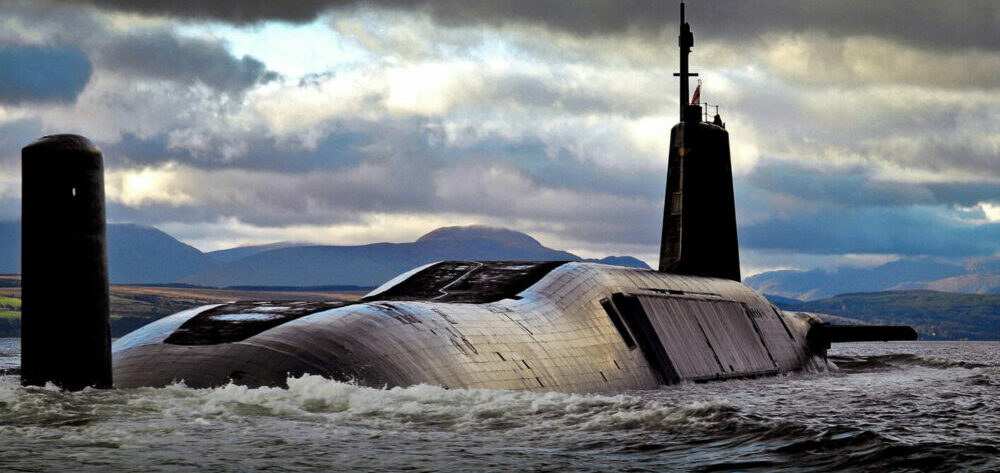Two projects vital for renewing the Trident nuclear weapons system on the Clyde have been damned as “unachievable” by a UK Government watchdog.
The building of new facilities at the Faslane and Coulport nuclear bases in Argyll, as well as the manufacturing of new submarine reactors, both had “major issues” which didn’t seem to be “resolvable”, according to the Infrastructure and Projects Authority (IPA).
The IPA has given the two projects its lowest rating of “red” for 2021-22, the worst in four years. The problems were attributed to “shortage of suitably experienced personnel”, “supply chain issues” and delays.
Campaigners have attacked the UK nuclear weapons programme as a “shambles”, warning that it has repeatedly failed to deliver. Replacing Trident was “murderous”, “reckless” and “insanely expensive”, they said.
The Ministry of Defence (MoD) insisted there had been “significant improvements” at Faslane and Coulport in recent months, resulting in the project no longer being rated as red. Production risks for submarine reactors were being “mitigated”, it said.
The latest IPA annual report for 2021-22 assessed 235 of the UK Government’s major infrastructure projects, 52 of which are run by the MoD. Nine of the MoD’s projects were rated as red, including new facilities at Faslane and Coulport and new submarine reactors.
According to the IPA, red meant that “successful delivery of the project appears to be unachievable”. This was because there were “major issues with project definition, schedule, budget, quality and/or benefits delivery, which at this stage do not appear to be manageable or resolvable.”
One of the nuclear projects rated as red was called “Clyde Infrastructure”. It involved “managing the design, delivery and transition into operational use of new build and updated infrastructure facilities in Her Majesty’s Naval Base Clyde (Faslane and Coulport).”
The project’s annual rating has fallen from green in 2018-19, to amber in 2019-20 and 2020-21, to red in 2021-22. Green meant there were “no major outstanding issues”, and amber that there were “significant issues”.
IPA blamed the problems at the Clyde bases on “significant external factors” which challenged delivery. These included “market shortage of suitably experienced personnel and supply chain issues”.
IPA accepted, however, that the project was “well-led and managed locally”. Despite the challenges “the programme continues to deliver to plan,” it said.
‘Significant challenges’ on nuclear submarines
The second MoD nuclear project rated as red was called “Core Production Capability”. That was meant to deliver “safe nuclear reactor cores to meet the Royal Navy’s submarine programme, now and for the long term”.
But according to the IPA, it was facing “significant and ongoing challenges” in delivering reactors for Dreadnought submarines. These are new boats planned to carry Trident nuclear warheads, and due to be based on the Clyde.
The project’s red rating in 2021-22 was the worst since 2017-18, when it was also red. In all the three intervening years it was assessed as amber.
Four other major MoD nuclear projects were rated as amber for 2021-22. They were seven new Astute attack submarines to be based at Faslane; the four planned Dreadnought boats; efforts to dismantle 27 defunct radioactive submarines; and work at the Devonport naval dockyard on the south coast of England.
The ratings for another three Trident upgrade projects run by the Atomic Weapons Establishment in England and France have been kept secret. Projects Pegasus, Mensa and Teutates were all deemed exempt from disclosure because of “national security”.
The Scottish Campaign for Nuclear Disarmament was “appalled” by the IPA’s findings. They “confirm the completely unrealistic and inflated efforts by the UK Government to maintain and upgrade their murderous nuclear weapons system,” said the campaign’s vice chair, Janet Fenton.
She added: “Questions raised with the MoD are left unanswered and recruitment difficulties continue as the Trident shambles – less and less credible and more and more reckless – evolves into the Dreadnought shambles.”
At the same time the radioactive remains of previous nuclear submarines “continue to rot and leak” at Rosyth dockyard in Fife, Fenton warned. The nuclear weapons programme endangered Scotland, the future of humanity and the planet, she argued.
“We say it is time to wake up, join the United Nations (UN) Treaty on the Prohibition of Nuclear Weapons and dismantle the insanely expensive and militarily useless liability that is inflicted on Coulport and Faslane,” she said.
Underlying issues ‘remain unaddressed’
The Nuclear Information Service, which researches and criticises nuclear weapons, highlighted the MoD’s poor record. “There is a repeated pattern of nuclear weapon infrastructure projects running late and going over budget,” said the service’s director, David Cullen.
“Almost invariably a budgetary increase, a change in the project scope or deadline is used to give the appearance of the problem being solved. But the underlying issues apparently remain unaddressed.”
He pointed out that the UN had been reviewing the nuclear non-proliferation treaty in New York during August. This commits countries with nuclear weapons “to pursue negotiations in good faith on effective measures relating to cessation of the nuclear arms race at an early date and to nuclear disarmament”.
Cullen added: “How often does the MoD have to reward failure before we can have a sensible debate about wherever we should continue to write a blank cheque to build weapons the government has promised to abolish?”
The Ministry of Defence stressed its “unequivocal commitment to the delivery of the UK’s independent nuclear deterrent”. The Royal Navy had maintained “continuous at sea deterrence” for more than 50 years, it said.
“Key manufacturing risks in the future Core Production Capability are being mitigated to minimise any impact,” an MoD spokesperson told The Ferret.
“Issues with the Clyde Infrastructure project were largely due to external factors, including Covid. Substantial work by the whole team has resulted in significant improvements and the project is no longer certified as red (June 2022).”
The Scottish National Party did not respond to requests to comment.
Cover image thanks to Ministry of Defence.














